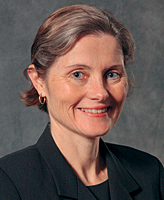
Forecasters expect this to be the worst year for global growth since World War II. Kellogg professors weigh in on the factors behind the economic crisis and the prospects for recovery
By Rachel Farrell
On Jan. 28, 2009, the global economy reached a new low.
The International Monetary Fund (IMF) reported that it had overestimated world growth for 2009. Growth was no longer projected at 2.2 percent, the rate the organization had anticipated in November 2008. Now, the IMF said, world growth was expected to be only 0.5 percent — the lowest rate in 60 years.
During a press briefing that afternoon, IMF Chief Economist Olivier Blanchard didn't mince words. "We now expect the global economy to come to a virtual halt," he said.
The world economy was once a robust financial system. What went wrong, and why?
Many people, including some Kellogg School professors, point fingers at the U.S. "The U.S. is the driver of global demand," says Kathleen Hagerty, the First Chicago Distinguished Professor of Finance and senior associate dean of faculty and research. "So if something happens to the U.S., it has a huge effect on China and India [and other countries]. When one guy goes down, everyone goes down."
The downward spiral, some professors say, can be traced to 2001. Shortly after the terrorist attacks of Sept. 11, Federal Reserve Chairman Alan Greenspan lowered the overnight interest rate to 1.75 percent to mitigate the effects of a mild recession. "Many people think that these low interest rates played a key role in the current crisis," says Sergio Rebelo, the Tokai Bank Professor of Finance, "because they fueled a rise in the demand for housing, which led to a substantial appreciation in home prices."
The housing bubble allowed investors to receive high returns on mortgage-backed securities, because "as mortgage credit expanded and home prices increased, mortgage default rates fell," says Rebelo. Even those facing foreclosure were able to take out a home equity line of credit or sell their homes for a profit, since home values were rising so quickly. "That made banks feel that it was safe to continue to increase their real estate exposure," Rebelo says.
| |
 |
| |
Photo © Evanston Photographic Studios |
| |
|
| |
"There are huge incentives for risk-taking. You get a giant reward if you get a big payoff, but you still get a truncated payoff if you blow it."
— Professor Kathleen Hagerty |
|
| |
|
To keep up with the purchasing demands of investors, brokers and banks turned to the subprime mortgage market. According to Hagerty, in certain instances, this risky behavior was encouraged. "There were incentive schemes present in these banks, which didn't reward people for being really careful," she says. "If you're a wild risk-taker, you're rewarded."
Banks were able to sell these sub-prime mortgages by pooling them with other loans and packaging them into mortgage-backed securities to form a new type of derivative: collateralized debt obligations, or CDOs. In theory, the AAA tranches of CDOs are safe, because it is unlikely that a large fraction of the mortgages in a CDO will default at the same time, explains Rebelo. In reality, many CDOs were the equivalent of "adding water to wine and putting it into new bottles," he says. Banks that built their portfolios around these derivatives found themselves in trouble when home prices started to fall in all major U.S. markets because it exposed them to massive losses. However, "it was their concentrated portfolio that was the problem, more than the fact that they were trading in derivatives," says Robert Korajczyk, the Harry G. Guthmann Professor of Finance.
By December 2007, the U.S. was officially in a recession, according to the National Bureau of Economic Research. Advanced economies, like Japan and the United Kingdom, and countries with close connections to the U.S. through product and capital markets, felt the impact most immediately and most severely, according to the IMF. The emerging and developing economies soon followed, although those with weaker connections to the U.S. (such as some African countries) weren't affected as quickly. "The lack of connections is good when things go bad and not so good when things go well," explains Mitchell Petersen, the Glen Vasel Professor of Finance. "Africa may be most immune to [the global recession] just because they tend to have the smallest connections to the rest of the world."
This year, the IMF predicts that advanced economies will post negative growth (around -2 percent), emerging and developing economies will fall by 3.3 percent, and world trade volume of goods and services will drop by 2.8 percent. As bad as those numbers sound, it could be a lot worse. Since mortgage-backed securities and CDOs were sold to investors outside the U.S., many countries shared a piece of the toxic pie when assets fell — which lessened the blow for everyone, says Petersen. "You want these losses spread out so that you won't have the [U.S] banking system fail," he explains, because that would have been catastrophic on a global level.
 |
|
| Photo © Evanston Photographic Studios |
|
| |
|
"Can you imagine the situation we'd be in now if we put the Social Security trust fund in the market."
— Professor Mitchell Petersen |
|
|
| |
|
It may also indicate that the U.S. is not entirely responsible for the worldwide economic meltdown. "I would say that excessive risk-taking had gotten more out of hand in the U.S. than other places," says Deborah Lucas, the Donald C. Clark/HSBC Professor in Consumer Finance. "But in Western Europe, there were similar kinds of irrational exuberance about housing markets and credit markets generally. There was an unprecedented worldwide bubble in asset prices — and then it all came crashing down."
An academic stimulus plan
Many Northwestern University professors say they are "cautiously optimistic" about President Barack Obama's economic stimulus plan — in part because there is no way to predict how effective it will be. "The honest truth is it's not clear that it's going to work," says Martin Eichenbaum, the Ethel and John Lindgren Professor of Economics. "The scientific evidence for it is at best mixed. Maybe we do want to extend unemployment benefits and help the states support people during tough times. But we don't want to say, 'Here's a shovel, here's a bucket, go fill up [that hole]' and think, 'Poof, that's going to fix everything.'"
Besides the stimulus plan, other changes to the U.S. financial system would help prevent another global crisis of this magnitude, professors say. Hagerty stresses that banks' compensation structure needs modification, since the current system encourages investors to engage in aggressive risk-taking. "There are huge incentives for risk-taking," she says. "You get a giant reward if you get a big payoff [on an investment], but you still get a truncated payoff if you blow it." Investors would be more selective with purchasing assets — and perhaps steer clear of securities like CDOs — if there were consequences for making bad investment decisions, she says.
Investors also need to be reminded of the classic rules of investment. "One of the things that we always teach at Kellogg is, whenever you see a really good investment opportunity, entertain the possibility that you're missing something," Petersen says. "In many cases, you'll find that there's something you're missing." For instance, there may be a risk factor to which the security is exposed. Or, there's a reason why an asset pays a high return: it's a risky investment. "If everybody could make more money in stocks and there was no negative, everyone would have all of their money in the stock market," says Petersen. "The stock market is great because it gives you a high expected return, but it's terrible because it's a lot riskier. Can you imagine the situation we'd be in now if we put the Social Security trust fund in the market?"
Increasing transparency in bank transactions and improving accounting techniques — such as methods for valuing assets — would also help strengthen the U.S. financial system. The current system allows banks to "conceal or hide or make obscure what they're doing," Hagerty explains. This gives bankers the freedom to do whatever is necessary to earn big bonuses, including providing unrealistically high valuations of assets.
Regulating the banks, however, may not be the correct solution. Typically, regulations aren't effective at controlling banks' bad behavior because banks find ways to maneuver around the rules, says Eichenbaum. For example, a bank might become a financial institution that doesn't fit into the category of a bank — and thus evade bank rules — or find ways to take items off a balance sheet. "Members of the banking institutions will leave, start their own firms and try to do some of those prohibitive transactions," says Petersen. When considering regulations, "think not just about the problem you're solving but about the incentives you're establishing for others to go around the system." In addition, consider that regulations can be more harmful than helpful, particularly when they prevent useful financial transactions.
| |
 |
| |
|
| |
"People need to be responsible for their own actions. That means that we have a responsibility to educate them."
— Professor Martin Eichenbaum |
|
| |
|
On a global level, regulating banks is not realistic, Lucas says. No existing international organization is capable of enforcing regulations, and "it's unlikely that there will be one," she says. "Countries have no intention of abiding by international authorities. There's value in international cooperation, but it has to be done by agreement and example." Creating regulations that would translate on a global scale would also be very difficult and complicated, since every country has a different financial system that frequently changes. "And in the end, I think every country is going to pursue its own interests," says Eichenbaum. "Maybe in a perfect world where people weren't selfish that would work, but that's not the world we live in."
In terms of international trade, Eichenbaum warns that the "buy American" mentality is dangerous. "There's always temptation to build a big fence around our borders — but that would be catastrophic," he says. "People love to emphasize that when we import goods, some Americans lose their jobs. But remember, a lot of American jobs are tied to the import sector, and there are huge benefits to those imports." The sneakers made in China are 30 percent cheaper than those made in the U.S., he notes, "so if you're a single mom, you can [afford] sneakers for your kids."
Eichenbaum adds that consumers need to be a part of the solution as well. To avert another sub-prime mortgage crisis, people need to be educated and taught that they shouldn't take on loans they can't afford. "People need to be responsible for their own actions," he says. "That means that we have a responsibility to educate them. It's appalling that people don't know, for instance, the terms of their mortgages or whether there's a penalty for pre-payment." He also suggests that the government develop standardized mortgage forms to avoid credit-loosening practices.
As devastating as the global recession is, it may be the wake-up call that the world needed. "This has been a lesson for people in that they can't ignore risk," says Lucas. "We're not in an era that is beyond business cycles. People need to be brought to their senses."
|



